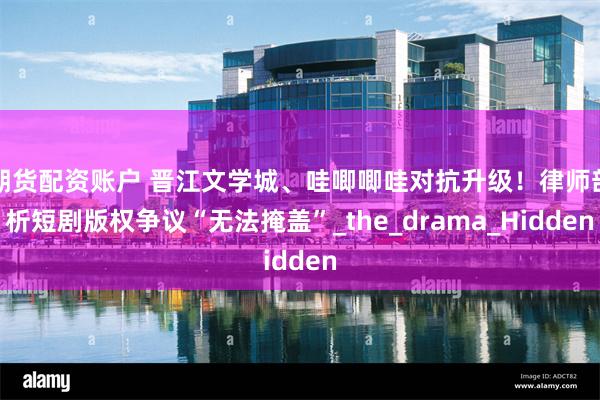期货配资账户 晋江文学城、哇唧唧哇对抗升级!律师剖析短剧版权争议“无法掩盖”_the_drama_Hidden

On the evening of June 24, the controversy surrounding the copyright dispute between Jinjiang Literature City and Wahajihwa Entertainment made headlines期货配资账户, highlighting the need for more defined copyright regulations within the short drama market.
A Micro-Drama Sparks a Battle Between Two Major Players
The dispute was ignited by the upcoming release of the micro-drama *\"Secretly Hidden, But Yours\"* on June 26. The official Weibo account of Jinjiang Literature City issued a statement claiming that Wahajihwa Entertainment, a company based in Horgos, had not obtained the rights to adapt *\"Secretly Hidden\"* into a micro-drama. Jinjiang alleged that the upcoming drama violated contractual agreements and might infringe upon the original work's copyright. They clarified that they had only authorized the adaptation of the story into a full-length web drama, with an additional 2024 agreement explicitly prohibiting its adaptation into a micro-drama.
展开剩余84%Wahajihwa Entertainment responded quickly with their own statement, denying any wrongdoing. The company argued that their original 2019 contract granted them the rights to adapt the work into any type of \"web drama,\" a term they defined as any internet-based series, regardless of duration. They also contended that the 2024 supplementary agreement did not specifically exclude the creation of a micro-drama, claiming that micro-dramas fell under the broader category of web dramas.
*\"Secretly Hidden, But Yours\"* is directed by Hu Xing and stars actors such as Tian Hongjie, Huang Panpan, Ma Zhe, Zeng Qingsheng, and Liu Boxu. The series is set to air on June 26, 2025.
Jinjiang Literature City is one of China’s most prominent online literature platforms, home to an immense library of original literary works. Over the years, the platform has been instrumental in providing content for numerous successful television adaptations, including *Nirvana in Fire*, *The Rebel Princess*, and *Word of Honor*.
Wahajihwa, on the other hand, is a major entertainment company involved in artist management and film production, known for creating several popular projects such as *Hard to Please* and *Dragon Youth*, which starred Bai Jingting, Zhang Ruonan, Zhang Ruofan, and Huang Yao. In 2023, Wahajihwa also produced a TV series adaptation of *Secretly Hidden*, featuring actors Zhao Lusi, Chen Zheyuan, and Ma Boqian.
Legal Insights Into the Copyright Dispute
At the heart of this dispute lies the question of whether Wahajihwa was granted the necessary copyright authorization to adapt the work into a micro-drama. This issue reflects a larger uncertainty surrounding the copyright and licensing process in the fast-growing short drama market.
In an interview with the media, lawyer Wei Zeng from Gaopeng (Nanjing) Law Firm explained that the focus of this case is on whether the film company has been granted the correct adaptation rights by the original author for creating a web short drama.
Article 26 of China’s Copyright Law specifies that licensing contracts should clearly define the scope of rights granted. However, Wei pointed out that in real-world scenarios, copyright licensing is often much more complex than the law's wording suggests. It's highly customized based on the nature of the transaction. In this case, Jinjiang claimed that they had only authorized the adaptation of *\"Secretly Hidden\"* into a web drama, not a micro-drama, while Wahajihwa argued that their authorization for web drama adaptation naturally included micro-dramas.
Wei further elaborated that for complicated projects like film or TV adaptations, copyright authorizations should be comprehensive and seamless. Any break in the chain of rights authorization could lead to an infringement claim. He noted that the interpretation of copyright contracts, especially when there’s a disagreement over the specific terms, should rely on a combination of textual, systemic, and customary interpretations, along with good faith principles. In this case, the interpretation of the contract clauses is essential to determining whether the original work’s rights have been violated.
Wei also pointed out that in 2020, China’s National Radio and Television Administration issued a notice defining micro-dramas as internet-based shows with episodes lasting no more than 10 minutes, making them the fourth officially recognized form of digital content after full-length web dramas, web films, and online animations. This legal recognition of micro-dramas may influence the interpretation of the copyright licensing agreements in question.
The Micro-Drama Industry’s Intellectual Property Concerns
Wei Zeng also stressed that the micro-drama industry must pay closer attention to intellectual property compliance. The micro-drama sector is currently experiencing rapid growth, evolving from a space filled with poorly made content to a thriving industry that now delivers high-quality productions. However, due to the low entry barriers, fast production cycles, and a large number of platforms for distribution, some micro-drama creators tend to overlook proper intellectual property management.
For example, many micro-dramas exhibit significant similarities in plot, character design, and even settings, raising concerns about potential copyright violations. Furthermore, some micro-dramas fail to secure the necessary permissions for elements like background music, scripts, and other creative components, which exposes creators to considerable legal and commercial risks. Wei sees the current dispute as a timely reminder for the micro-drama industry to pay more attention to intellectual property compliance and adopt a more legally sound approach to ensure long-term, healthy development.
This case serves as a wake-up call to the entire short drama sector, urging creators to take intellectual property law seriously to avoid future legal complications.
**Source: Ziniu News期货配资账户, Yangtze Evening News**
发布于:山东省


